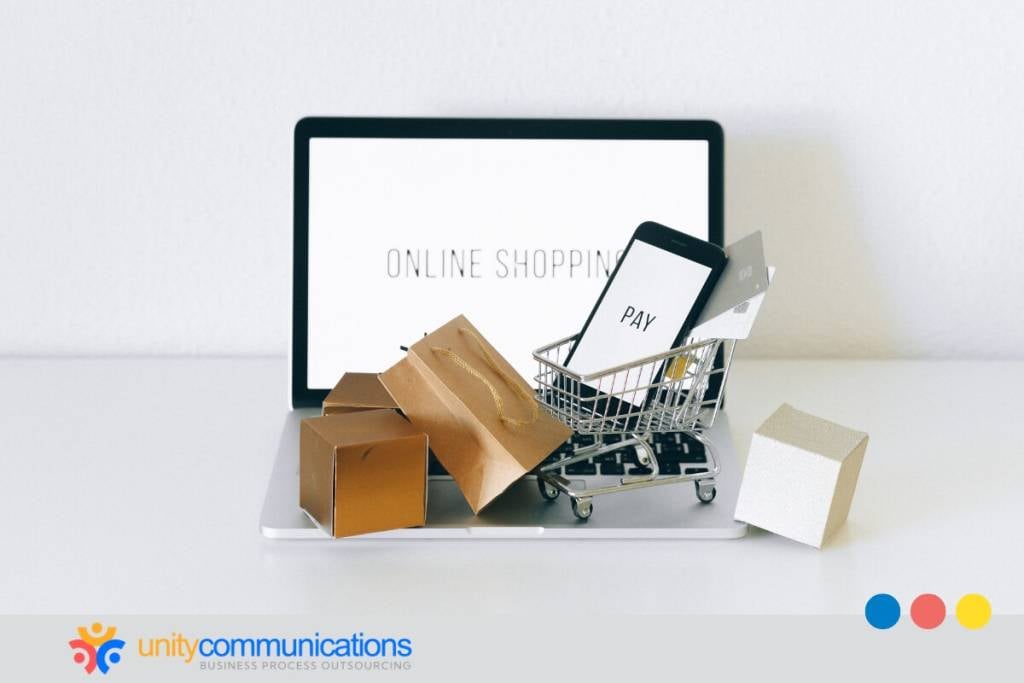IN THIS ARTICLE
Table of Contents
As your online shop receives a growing number of orders, you might find it lacks the in-house staff to address inquiries in real time. Trying to keep up with the demand can cause an imbalance between core and non-core processes and resource allocations.
Business process outsourcing (BPO) exists to help ease your burdens. Service providers optimize certified professionals and robust technologies to improve efficiency and deliver a superior customer experience.
Do you want to know how outsourcing benefits your e-commerce business? Are you curious to learn practical tips on finding the best provider? Stay on this page to learn more!
Ways BPO improves your e-commerce enterprise

The global e-commerce market has grown significantly since the advent of online shopping technology. In 2023 alone, the sector reached $21.1 trillion in revenue. According to IMARC Group, the industry will expand at a compound annual growth rate (CAGR) of more than 27% to reach $183.8 trillion by 2032.
Expanding cross-border trade opportunities and secure digital payment systems drive the market’s growth. However, as numerous online retail platforms become widespread, e-commerce businesses also face increased front- and back-office backlogs.
This is why outsourcing plays such a crucial role in e-commerce. Service providers supply a flexible workforce and advanced tech to streamline your business operations. The sections below show what BPO contributes to your online store.
Speed up order fulfillment and processing
BPO companies use artificial intelligence (AI) and robotic process automation (RPA) tools to help e-commerce clients accelerate order management. These systems automate transaction data entry, payment processing, and inventory updates.
These technologies also enable providers to carry out round-the-clock order fulfillment and processing services for global consumers. So even without frequent human intervention, AI and RPA work to process orders at all hours, accommodating buyers in different time zones.
Third-party vendors also perform the functions below to boost your online business operations:
- Provide access to rapid shipping and fulfillment centers. BPO firms have these facilities to minimize delivery times. Utilizing multiple centers lets them distribute orders faster and more efficiently.
- Offer specialized packaging services. The client’s varied products can have unique packaging requirements. Efficient and customized packaging improves your brand image and ensures on-time order deliveries.
- Handle the entire return process. By taking over this task, BPO providers let you focus on your core competencies. They inspect returned items, authorize refunds, and update the inventory accordingly.
- Enable real-time order tracking. Third-party vendors employ automated purchase tracking platforms to expedite your logistics processes. This system allows them to quickly respond to customer inquiries regarding order status.
Enhance customer service
BPO call centers employ skilled agents and advanced tools to enhance your e-commerce customer support. They use omnichannel systems to give workers an integrated view of consumer inquiries across social platforms. These dashboards also allow them to address concerns without losing data while seamlessly switching channels.
Service providers use chatbots to resolve consumer issues more effectively, improving customer satisfaction. According to a recent study, buyers stated chatbots respond faster than human agents. They reported that the automated channel can provide accurate and helpful product information.
Besides answering inquiries, here are the advantages of outsourcing your e-commerce customer service:
- Manage order-related inquiries, such as returns requests and shipment updates.
- Address customer complaints diplomatically and promptly.
- Provide agents proficient in multiple languages to support a diverse customer base.
- Conduct customer feedback collection and analysis for improvement recommendations.
Boost digital marketing
Outsourcing your e-commerce digital marketing tasks to a third party gives you improved cost savings and expanded reach. BPO providers optimize their creative workers and innovative solutions to boost your social media presence and broaden your customer base. They make these goals possible through the following functions:
- Search engine optimization (SEO) support. BPO firms have a dedicated in-house team with expertise in SEO techniques. They use these strategies to optimize product listings, website content, and other promotional materials. This service helps improve your search engine rankings and drive organic traffic to your e-commerce site.
- Content creation and management. Providers produce and monitor high-quality digital content for various formats, including blogs, social media posts, and email campaigns. They make these materials compelling to attract or retain your target audience.
- Social media management. This BPO service involves scheduling posts, responding to customer inquiries, and running targeted advertising campaigns. It helps your e-commerce business maintain an active and influential social media presence.
- Paid advertising assistance. Planning and executing paid promotional campaigns is another critical role of outsourcing teams in e-commerce. Providers oversee these activities on platforms such as Google Ads and Facebook Ads to increase your visibility.
- Market research and competitor analysis. BPO vendors offer these services to help identify industry trends, consumer preferences, and potential areas for improvement. The resulting insights shape your cost-effective digital marketing strategies.
- Multilingual marketing. BPO companies with multilingual capabilities assist you in reaching a global audience. They create and manage digital promotions in different languages. This service is particularly valuable if you plan to target international markets.
Best practices for outsourcing in e-commerce

Maximizing the benefits of outsourced e-commerce requires strategic planning. You need to know what tasks and roles to outsource so that you can match the BPO approach to your in-house goals and strategies. Learn and apply these best practices when partnering with a provider:
- Outline your e-commerce outsourcing objectives. Whether you aim to reduce costs or accelerate order fulfillment, clarify your BPO targets to ensure returns on investment (ROI).
- Choose a BPO partner with expertise and good standing in e-commerce. While conducting due diligence, note prospects’ track records, client testimonials, and service packages. Seek a provider whose strengths complement your requirements.
- Ensure the BPO firm has robust data security and compliance measures. Your online shop deals with sensitive customer and business information. Verify the provider’s information handling, storage, and privacy protection protocols. This step helps companies avoid losing $4.45 million due to a data breach alone.
- Validate cost transparency. Request a detailed pricing model from the vendor. Understanding direct service and hidden fees is crucial to properly budgeting your in-house and BPO funds.
- Hire a BPO firm that can scale its services and resources accordingly. This capability helps your team address fluctuations, especially during peak seasons or promotional events.
- Specify service-level agreement (SLA) terms and conditions. Detail your performance standards, expected response times, and key metrics per outsourced function. Make sure you and your BPO partner are on the same page.
- Establish effective communication with your selected vendor. Assign a contact person or team to facilitate smooth collaboration and resolve issues quickly. Having open interactions also ensures both parties understand expectations and goals.
- Determine potential risks associated with outsourcing. Work with your BPO partner to develop a mitigation plan. This plan should detail contingency measures for unexpected service disruptions, natural calamities, market changes, or geopolitical issues.
- Confirm the BPO firm’s compatibility with your existing systems. Seamless infrastructure integration helps avoid operational delays and facilitates smooth data sharing.
- Implement streamlined quality assurance processes. Set key performance indicators (KPIs) to monitor and measure your service provider’s output. Regular audits and feedback mechanisms contribute to maintaining high service standards.
- Support training and knowledge transfer activities. Provide company manuals to ensure the BPO team understands your business processes, values, and target customers. Regular meetings help keep the provider updated on changes.
- Consider cultural sensitivity. Be mindful of cultural differences if you outsource your e-commerce functions to an overseas provider. Recognizing and respecting cultural nuances enhances work relationships and prevents misunderstandings.
What awaits e-commerce outsourcing in 2024?
As you leverage outsourcing to elevate your e-commerce business, you must anticipate and adopt the industry’s latest trends. As we look ahead to 2024, tech advancements, shifting customer expectations, and global market dynamics are expected to transform the e-commerce outsourcing sector.
Generative AI is among the most important trends that will hone the industry. BPO firms use this modern solution to improve e-commerce processes, from customer service to digital marketing. According to a recent report, generative AI could decrease the volume of human-serviced contacts by up to 50%, depending on an organization’s automation capacity.
This technology also helps personalize product search and discovery using multimodal sources, such as text displays, images, and voice commands. It assists providers in profoundly understanding your customer profiles and preferences.
The resulting insights guide them in identifying and prioritizing sales leads. The third-party unit then develops comprehensive consumer profiles and recommends actions to enhance client engagement across various channels.
The bottom line

The role of outsourcing in your e-commerce business goes beyond cost reduction and access to scalable resources. Hiring a BPO company lets you experience accelerated order management and customer service. Besides, the contractor helps expand your market reach by producing and handling creative digital content.
But before maximizing such advantages, you must know and implement the best practices for seeking the right BPO partner. Moreover, you should keep up with the latest industry shifts to further align your enterprise and outsourcing goals. These approaches allow you to attain increased profitability and efficiency while working with the provider.
Let’s connect to exchange knowledge on how to optimize outsourcing for the e-commerce industry. Unity Communications also offers cost-effective human and tech resources to boost your online shop’s front- and back-office operations.





